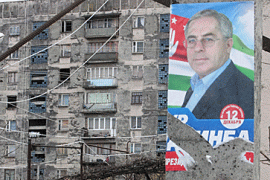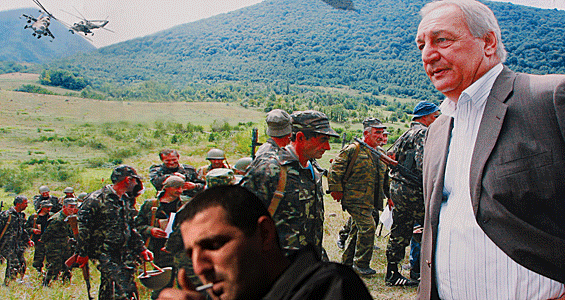Abkhaz vote recalls wounds of war
Abkhazia moves to elect new leader for first time since Russia declared it independent.

 |
| Sergei Bagapsh, Abkhazia’s leader, denies his region is a puppet state [EPA] |
People in the disputed Black Sea region of Abkhazia are voting for a new president for the first time since Russia controversially recognised it as an independent state. But while many welcome the vote, others fear it will revive unrest in the region.
In the rocket-scarred suburb known as the “New Region” of the Abkhaz capital, it’s hard to ignore the reminders of the war fought to break away from the former Soviet republic of Georgia in the early 1990s.
In this grey forest of stark, concrete apartment blocks, children play amid piles of rubble and rusting junk next to smoke-damaged walls still pockmarked with shrapnel holes.
Here, people are grateful to Russia for recognising Abkhazia as an independent state last year, and sending in thousands of troops to establish military bases and patrol the disputed border with Georgia.
Moscow made the controversial move after the Georgia-Russia war in August 2008.
“We feel more secure now,” said one New Region resident, an unemployed man called Igor Nagibin.
“Georgia has always been threatening Abkhazia, and if it hadn’t been for the Russian forces, things would have been really bad.
“Russia is the only country that is helping us – of course we are thankful,” he said.
‘Puppet regime’
Abkhazia is a fertile, sub-tropical Black Sea region which used to be the favourite holiday destination of the Soviet dictator, Josef Stalin.
|
“Economically, Abkhazia is gradually turning into a subsidised region of Russia” Spokesman for presidential candidate Zaur Ardzinba |
Many people here see the presidential elections on Saturday as another step forward to sovereignty after years of hardship, isolation and clashes with Georgia – an exercise in nation-building.
Election posters for the incumbent Abkhaz leader, Sergei Bagapsh, depict him in statesman-like poses with Dmitry Medvedev, the Russian president, and Vladimir Putin, the prime minister.
But because Abkhazia depends on Russian support and military protection, the Western-backed government in Georgia has accused the region’s leadership of being a “puppet regime”, whose strings are pulled by Medvedev and Putin.
That is an accusation which Bagapsh strongly rejects.
“We could say the same thing, that the Georgians are puppets in the hands of the United States,” he told Al Jazeera.
All the challengers for the Abkhaz presidency are essentially pro-Russian, but one has accused Bagapsh of allowing the Kremlin too much control and influence.
“Economically, Abkhazia is gradually turning into a subsidised region of Russia,” a spokesman for Zaur Ardzinba, another presidential candidate, told the AFP news agency.
Bagapsh said many countries were dependent on their neighbours in some way.
“It was our request that Russian troops came to guard our borders, because it is a matter of our security,” he said.
Lawrence Sheets, the Caucasus project director for the International Crisis Group think tank, suggested there were few distinct policy differences between the candidates on relations with Russia and Georgia.
“The government and opposition candidates don’t see the relationship with Russia as equal; they see Abkhazia as the junior partner and they see nothing wrong with that, although some candidates are worried that Abkhazia might be swallowed up by Russia,” he said.
“They also agree that there is almost nothing to talk about with Georgia.”
‘Genuine democracy’
“Freedom, prosperity, stability,” reads a slogan on a poster on the office door of the Young Abkhazia movement.
|
“These elections are very important for our people because they show … that the recognition of our independence was not in vain” Sasha Galkin, Young Abkhaz activist |
Groups of Young Abkhazia activists have been getting together each evening to canvas public support for Bagapsh, who’s running for re-election against four opposition challengers.
Taking a break from knocking on doors and handing out campaign material to potential voters in Sukhumi, 21-year-old student Sasha Galkin said he thought that the presidential polls represented more progress towards building a genuine democratic state.
“These elections are very important for our people because they show our state has become something substantial and that the recognition of our independence was not in vain,” he said.
Abkhazia may have its own national anthem, flag and passports, but apart from Russia, only Nicaragua and Venezuela have recognised it as an independent state.
The rest of the world still regards it as a part of Georgia.
Georgian refugees
The Georgian authorities have condemned the Abkhaz elections as illegitimate, and a spokeswoman for Mikheil Saakashvili, Georgia’s president, described the polls as a “comedy” staged by Moscow on what his country regards as territory occupied by Russian forces.
|
“I think that the wounds of war have not healed yet and people’s grief is still strong; that is why we can’t yet speak about the return of the refugees” Sergei Bagapsh, Abkhaz leader |
Georgia believes that a resurgent Russia is using Abkhazia as a tool to help restore its power in the former Soviet Union, and reduce the influence of the West.
Around a quarter of a million Georgians fled Abkhazia because of the war in the 1990s.
Some 40,000 were allowed to return, but many still live in distressing conditions in dilapidated temporary accommodation.
Just a few kilometres away from Abkhazia, in an austere apartment block in an impoverished district of the town of Zugdidi, elderly refugee Isolde Mikhailovna is still dreaming of returning to the home she abandoned.
“I’ve been here for 17 years and still haven’t got used to it,” she said.
“My children, they already forgot everything, but I didn’t forget – how could I forget my homeland?”
She was scathing about the presidential elections in Abkhazia.
“They’re not valid – how they can elect an Abkhaz president if there are so many refugees from Abkhazia living in Georgia?” she demanded.
Wounds of war
But Bagapsh said it was unlikely that people like Isolde would be able to go back soon, if ever.
“I think that the wounds of war have not healed yet and people’s grief is still strong; that is why we can’t yet speak about the return of the refugees,” he said.
After the last presidential elections in Abkhazia in 2004, the results were disputed and there were violent clashes between supporters of Bagapsh and his main opponent, Raul Khadzhimba.
Both men are standing again, and if the result is close or the contest goes to a second round, there are fears of more unrest, said Lawrence Sheets of the International Crisis Group.
“Opposition candidates are openly saying that if the elections are falsified, there will be a very volatile situation, and people’s emotions will be hard to control,” he said.